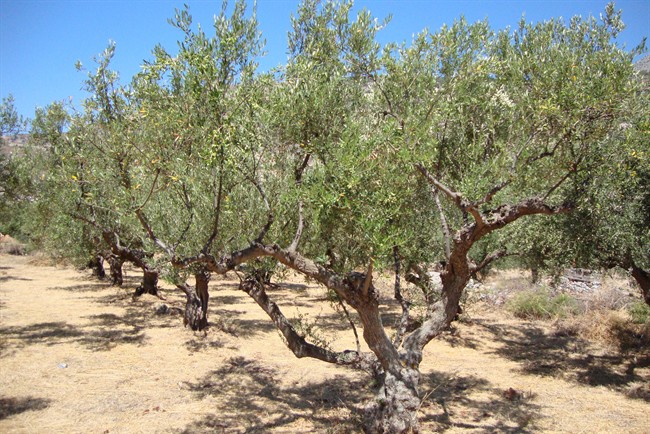TORONTO – With a poor harvest of olives in traditional high-producing countries like Spain and Italy pushing global production to a 15-year-low and driving up the price of olive oil, it’s more important than ever for consumers to be wary of what they’re buying.

“Olive oil is magical to me. When you taste a great olive oil it’s something you get hooked on,” says chef Christine Cushing, who has been producing olive oil from trees grown in a remote area of Greece for a decade.
MORE: Recipes featuring olive oil — Chorizo and kale pasta, sponge cake
While Greece, the third-largest producer in the world, had a superb harvest last year, Spain and Italy, the No. 1 and 2 producing countries, were hit by frost. Then moisture and humidity in the summer, when the trees prefer arid conditions, gave rise to the olive oil fly, a pest that burrows into the fruit.
“A lot of Italian producers didn’t even press,” says the Toronto-based Cushing. “They just left the olives to rot. It was that bad.”
And civil war in Syria, another large producer, has affected that country’s output.
Although the industry is regulated, the rules are often broken and it’s becoming more challenging to catch offenders.
“I liken it to athletes who are trying to take enhancing drugs,” says Cushing.
“You have to be one step ahead of them to be able to detect those drugs. So it’s the same sort of thing in olive oil. You have to be one step ahead of the guys who are analyzing because they have big bucks and it’s a big industry. So wherever there’s the ability to make millions of dollars there’s going to be fraud, right?
“I say people have to learn for themselves what a great olive oil tastes like and the characteristics, more importantly, of a bad olive oil.”
In scanning store shelves, if you see a litre of olive oil labelled extra virgin for $3.99, pass it by.
“I don’t care if it says ‘the holy father’s extra-virgin olive oil,’ it’s a lie. It cannot be,” says Cushing.
“Good olive oil has never been cheap, just because of the way it’s produced. But I think again, North Americans are not understanding of what a good olive oil is.”
The average Canadian consumes 1.5 litres of olive oil a year, while Greeks consume 26 litres or up to 125 ml (1/2 cup) per day.
Many producers hand harvest or use nets to catch the ripe fruit, which should be taken directly to be pressed. Olives that are overripe or left on the ground too long with leaves and moisture before being pressed will yield an oil with a rancid odour and greasy taste.
The first pressing, which results in extra-virgin olive oil, cannot involve any application of heat or chemicals. The next pressing is virgin olive oil, also cold pressed or extracted, using a temperature no higher than 27 C.
- Several baby products have been recalled by Health Canada. Here’s the list
- ‘Super lice’ are becoming more resistant to chemical shampoos. What to use instead
- Is home ownership only for the rich now? 80% say yes in new poll
- Invasive strep: ‘Don’t wait’ to seek care, N.S. woman warns on long road to recovery
“As you press more and more times, less oil is going to come out, so they heat it to a super-high temperature to extract every little droplet of oil that’s in there — virgin, then pure olive oil. Pure is actually the lowest grade,” she explains.
The worst enemies of olive oil are heat, light and air, so look for oil in a dark bottle with a best-before and/or harvest date. A good-quality olive oil will be sealed.
You could also check for a sticker indicating PDO, or Protective Designation of Origin, a European Union assurance of quality.
As with wine, olive oils have different characteristics and aromas — fruit, pepper, tomatoes, almonds — depending on the cultivars and terroir. Some stores have tasting bars where you can sample the oil.
Buy what you think you’re going to use. Use it up and buy it again so you can have it at its best, says Cushing, who does cooking segments on The Marilyn Denis Show.
“Don’t save it for good. Everybody’s worth a great olive oil.”





Comments